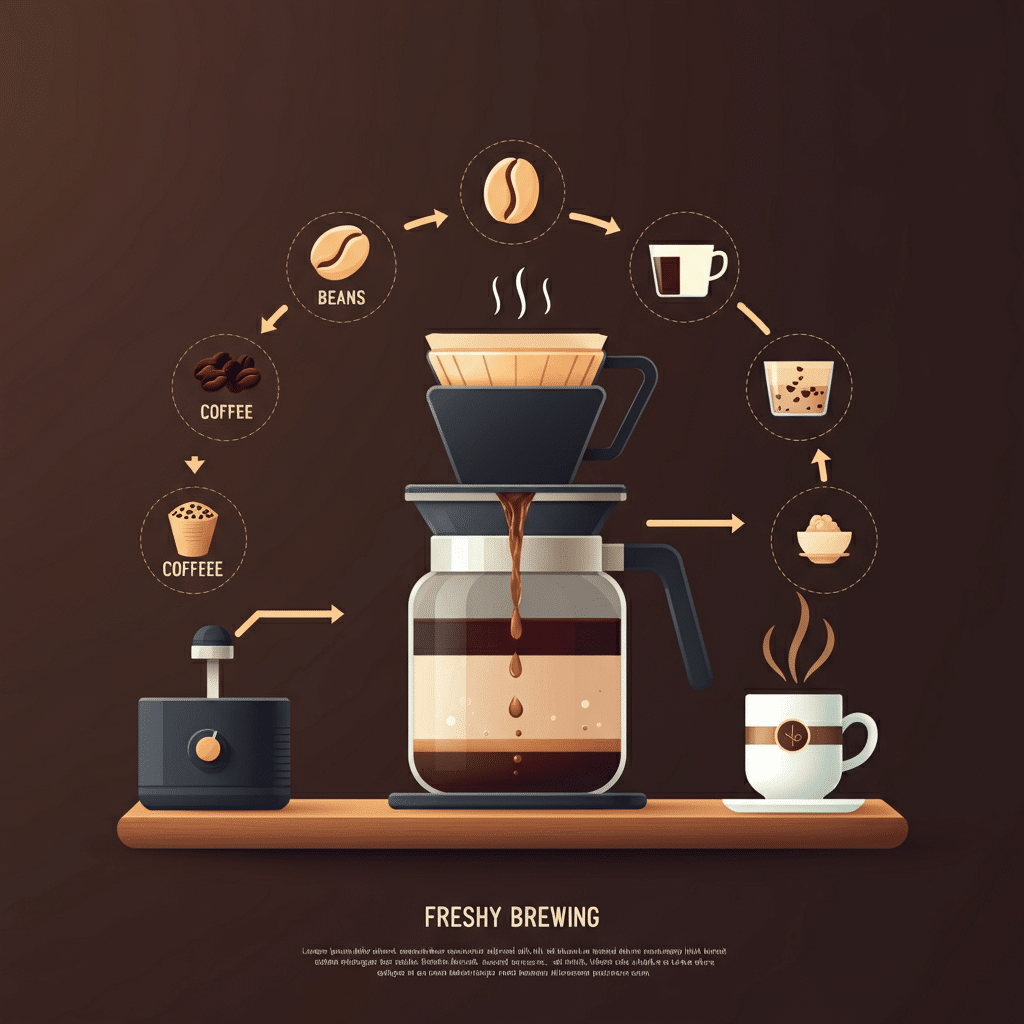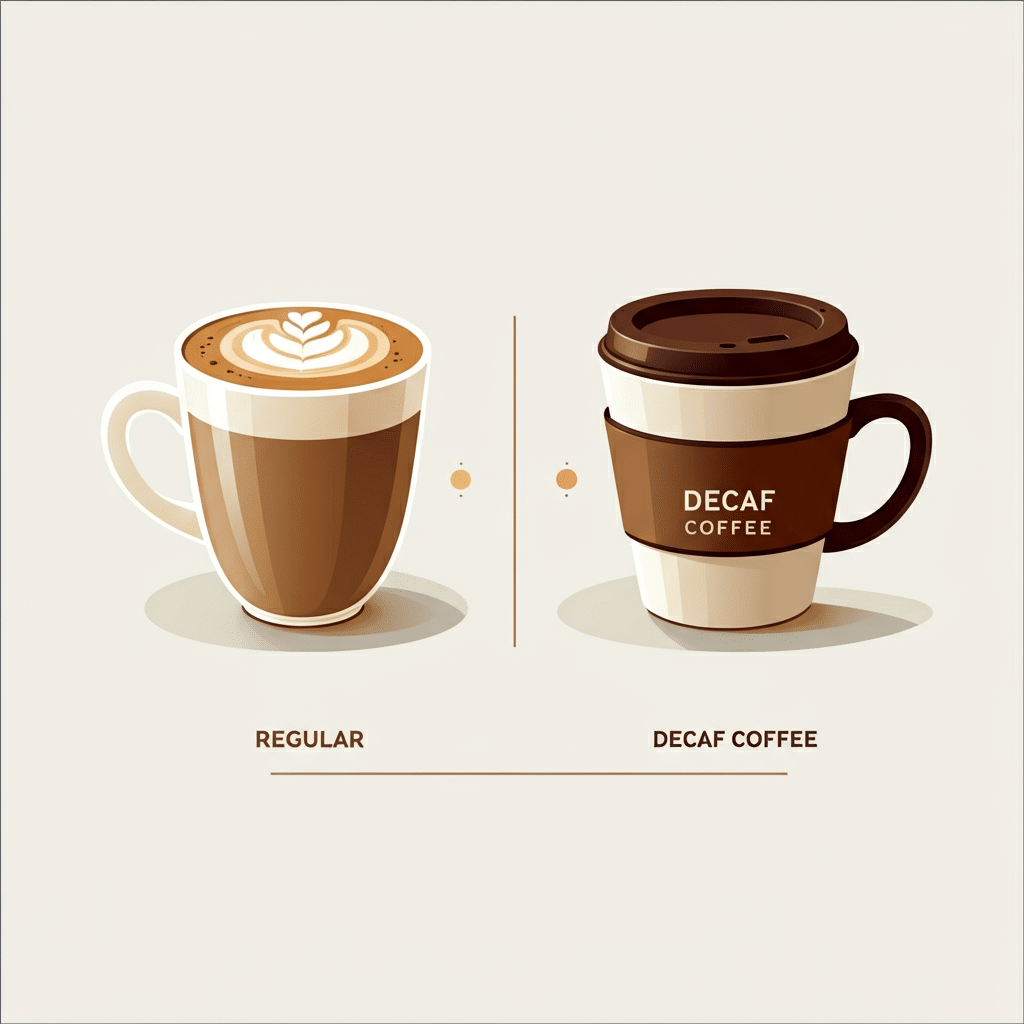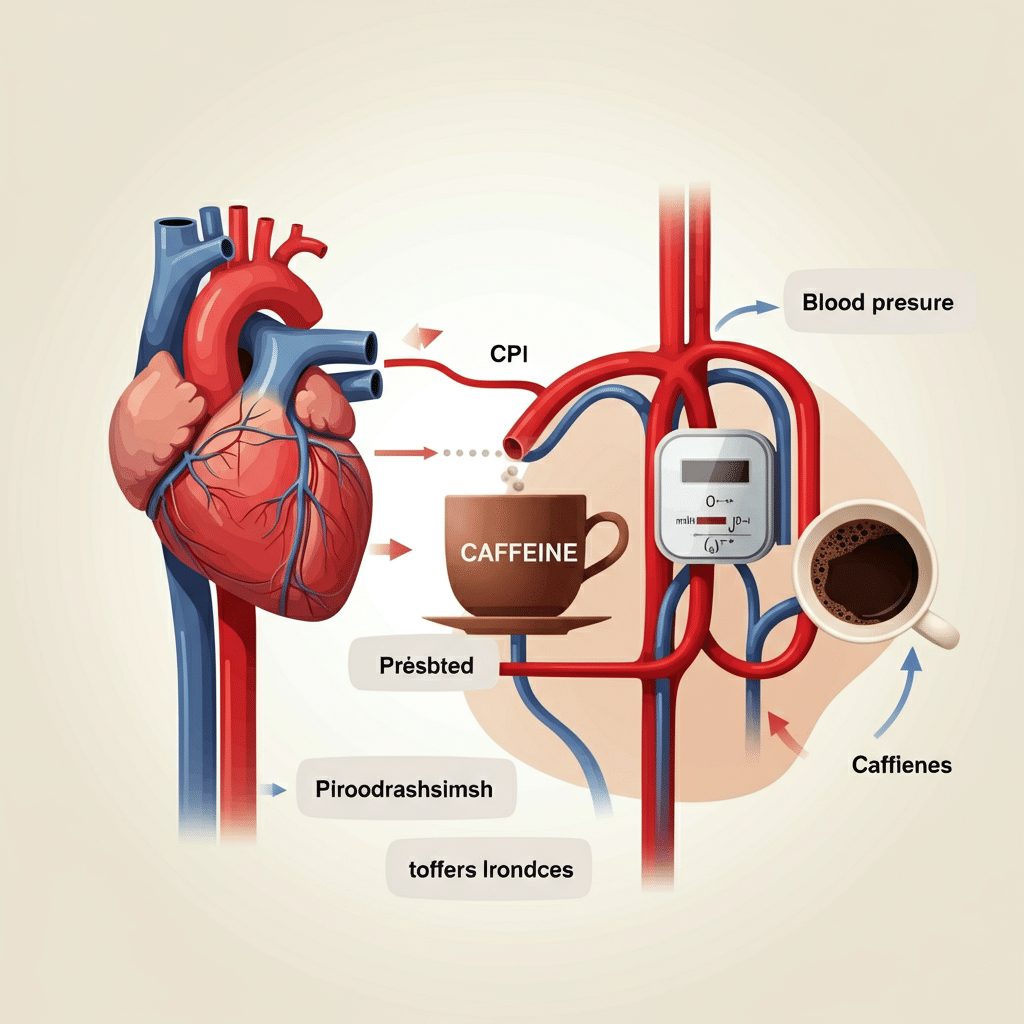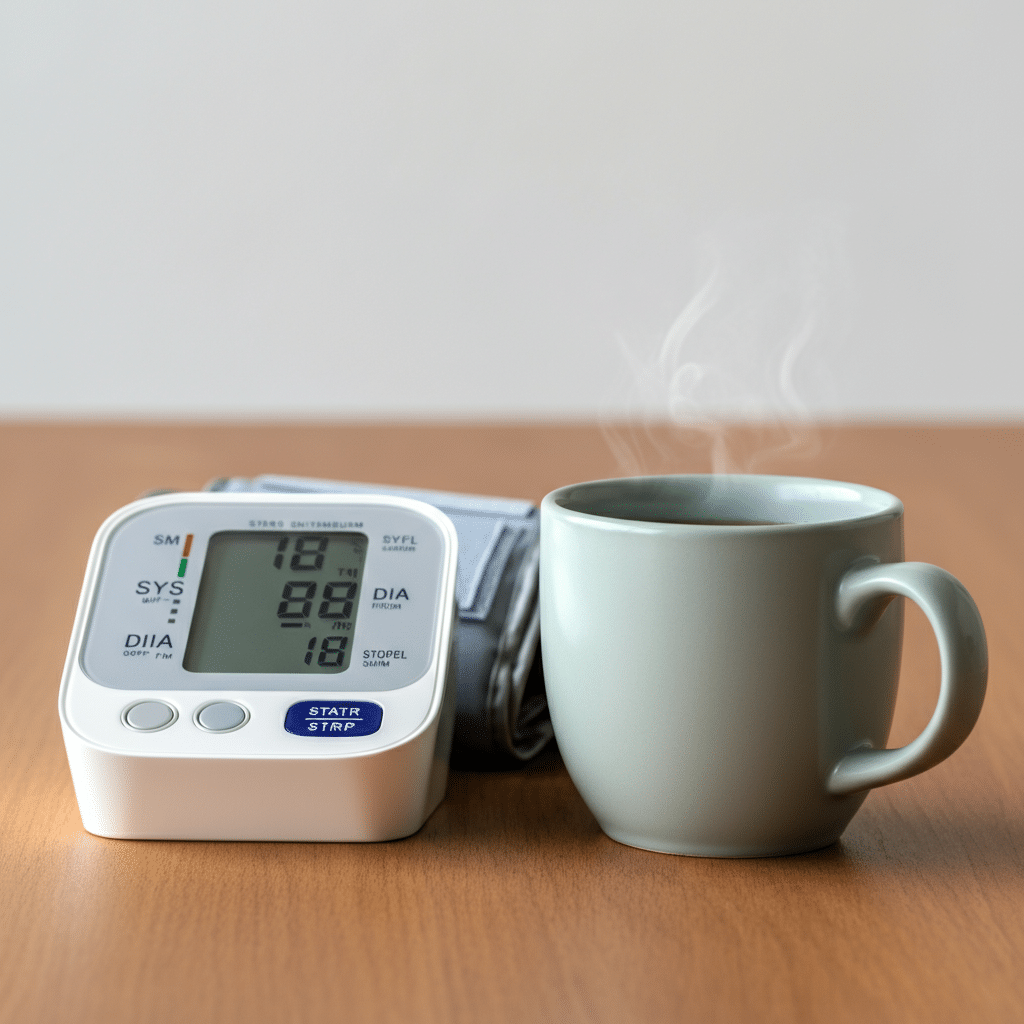This guide explores coffee’s effects on blood pressure, covering scientific insights, the roles of various factors like genetics and lifestyle, and practical advice for coffee lovers concerned about their health. Additionally, we’ll look at the cultural significance of coffee, bust some common myths, and examine the benefits of decaffeinated options for those looking to cut back on caffeine.
How Coffee Impacts Blood Pressure
The Role of Caffeine
Caffeine, the main active ingredient in coffee, is what gives the beverage its characteristic energy boost. Caffeine blocks adenosine, a neurotransmitter in the brain responsible for promoting relaxation and sleepiness. This blockage results in heightened alertness, a faster heartbeat, and, in some cases, a temporary increase in blood pressure.
When caffeine enters the bloodstream, it stimulates the release of adrenaline and narrows blood vessels, triggering a surge in blood pressure. For some individuals, particularly those sensitive to caffeine or who don’t consume it regularly, this effect can be more pronounced.

The Temporary Spike
Studies show that caffeine consumption can lead to a short-term rise in both systolic and diastolic blood pressure. These spikes usually occur within 30 minutes of consuming coffee and can last for three to four hours before subsiding. For most healthy adults, this transient increase in blood pressure isn’t harmful. However, for those with pre-existing hypertension or heart conditions, frequent spikes may exacerbate health risks.
Coffee and Long-Term Blood Pressure Effects
Building a Tolerance
For habitual coffee drinkers, the body often adapts to regular caffeine exposure. This adaptation means that the spike in blood pressure diminishes over time with consistent consumption. Therefore, occasional coffee drinkers are more likely to experience pronounced blood pressure changes compared to those who consume coffee daily.
Potential Health Benefits
Interestingly, long-term coffee consumption may not pose significant risks to blood pressure levels. Some research even suggests potential cardiovascular benefits due to coffee’s high antioxidant content. Bioactive compounds like polyphenols in coffee can help reduce oxidative stress and improve overall vascular health, possibly counterbalancing caffeine’s short-term effects.
A meta-analysis published in the European Journal of Preventive Cardiology found that moderate coffee drinkers (3-5 cups per day) tend to have a lower risk of cardiovascular diseases, including coronary artery disease and stroke. This implies that coffee, when consumed in moderation, isn’t just safe but could actually support heart health in the long run.

Factors Influencing Coffee’s Impact on Blood Pressure
The effects of coffee aren’t universal; individual factors significantly impact how caffeine interacts with your body and blood pressure.
Age and Caffeine Sensitivity
Older adults may metabolize caffeine more slowly due to changes in liver function and slower metabolism. These changes can amplify caffeine’s cardiovascular effects, leading to prolonged periods of elevated blood pressure. Conversely, younger individuals often have higher tolerance levels and metabolize caffeine more quickly.
Genetics Matter
Everyone’s genetic makeup plays a role in caffeine metabolism. For instance, variations in the CYP1A2 gene influence how quickly your body breaks down caffeine. People with the fast-metabolizing variant of this gene tend to experience fewer cardiovascular effects, while those with the slow-metabolizing variant might see more pronounced changes, including elevated blood pressure.

Lifestyle Habits
Lifestyle choices can also modify how caffeine affects blood pressure. For instance, combining coffee intake with unhealthy habits like smoking, a high-sodium diet, or sedentary behavior can amplify its adverse effects. Meanwhile, an active lifestyle paired with a balanced diet may mitigate these risks.
Decaffeinated Coffee as an Alternative
When cutting back on caffeine but still craving the taste of coffee, decaffeinated coffee serves as an excellent alternative. Decaf coffee retains many of the beneficial compounds found in its caffeinated counterpart, such as antioxidants and polyphenols, which promote vascular health.
Health Benefits of Decaf
Decaffeinated coffee offers the same rich flavors as regular coffee but without the stimulating effects of caffeine. This makes it a safer option for individuals with high blood pressure, heart conditions, or caffeine sensitivities. Furthermore, studies suggest that decaf coffee can still provide moderate cardiovascular benefits by improving endothelial function and reducing inflammation.
Busting Myths About Decaf
One common myth is that decaf coffee isn’t “real” coffee or that it lacks any of the health benefits associated with regular coffee. However, the decaffeination process only removes caffeine while preserving most of the antioxidants and bioactive compounds that make coffee a healthful beverage.
Coffee in Culture
Coffee holds a unique place in cultures around the world, playing roles that go far beyond its chemical properties. From traditional Ethiopian coffee ceremonies to the bustling coffeehouses of modern cities, this beverage is deeply intertwined with community, ritual, and identity.

Coffee and Social Bonds
Coffee often serves as a simple yet powerful way to connect with others. Social customs, from inviting someone for a morning coffee to networking over a cup, demonstrate its role as a tool for fostering relationships. These rituals can contribute to mental well-being, which indirectly impacts physical health, including blood pressure. Shared coffee experiences often promote relaxation and reduce stress, which can help counteract caffeine’s temporary effects on blood pressure.
The Global Coffee Industry
The global love for coffee has grown into a massive industry, with specialty cafes and artisanal roasters making high-quality coffee more accessible. Understanding its cultural significance might make you reconsider coffee not as a health risk but as a socially enriching component of daily life.
Myths vs. Facts About Coffee and Health
There are a number of myths surrounding coffee and its effects on health. Separating fact from fiction is crucial for understanding its real impact on blood pressure and overall wellness.
Myth #1: Coffee Causes Chronic Hypertension
Fact: While coffee can cause a temporary rise in blood pressure, there’s no strong evidence linking moderate coffee consumption to chronic hypertension. Regular consumers tend to develop tolerance to caffeine’s effects, and studies suggest coffee may even protect against certain cardiovascular conditions.
Myth #2: Decaf Coffee is Unhealthy
Fact: Decaffeinated coffee retains most of the beneficial antioxidants found in regular coffee. It’s a fantastic option for those who want to enjoy coffee’s flavor and health benefits without adverse effects on blood pressure.

Myth #3: Coffee is Dehydrating
Fact: While caffeine has a mild diuretic effect, regular coffee drinkers tend to build tolerance to this aspect as well. Research shows that coffee contributes to daily fluid intake and does not significantly impact hydration status.
Myth #4: More Coffee Means More Energy
Fact: Drinking excessive amounts of coffee can lead to jitteriness, increased heart rate, and potentially worsen high blood pressure for sensitive individuals. Moderation is key to reaping its benefits without adverse effects.
Practical Tips for Coffee Lovers
Maintaining a healthy relationship with coffee is entirely possible, even for those concerned about blood pressure. Here’s how to enjoy your coffee while keeping health in mind:
- Stick to Moderate Consumption
- Limit your intake to three to four cups a day, depending on your tolerance levels.
- Opt for Low-Caffeine Beans
- Choose arabica beans, which contain less caffeine than robusta beans, or go for decaf varieties.
- Time Your Coffee Smartly
- Avoid drinking coffee late in the day to prevent sleep-disrupting effects that might indirectly influence blood pressure levels by affecting your rest.
- Experiment with Brewing Methods
- Some brewing techniques, like cold brew, naturally produce coffee with lower acidity and fewer compounds that can irritate the stomach or impact blood pressure.
- Pair Coffee with Healthy Habits
- Combine coffee consumption with other heart-healthy habits, like regular exercise, a balanced diet, and stress management, to minimize risks and optimize benefits.

Final Thoughts
The relationship between coffee and blood pressure is nuanced, influenced by short-term and long-term effects, individual differences, and broader lifestyle choices. While coffee does cause temporary blood pressure spikes, evidence suggests that moderate, regular consumption poses minimal risks and may even offer cardiovascular benefits for most people.
Whether you stick to your morning cup, switch to decaf, or enjoy coffee as part of a social ritual, the key lies in balanced consumption and understanding your body’s unique responses. Coffee’s place in both culture and personal health makes it more than just a drink; it’s a versatile component of countless lives worldwide. With mindful habits, coffee can continue to be a pleasurable part of your day while supporting your health goals.















